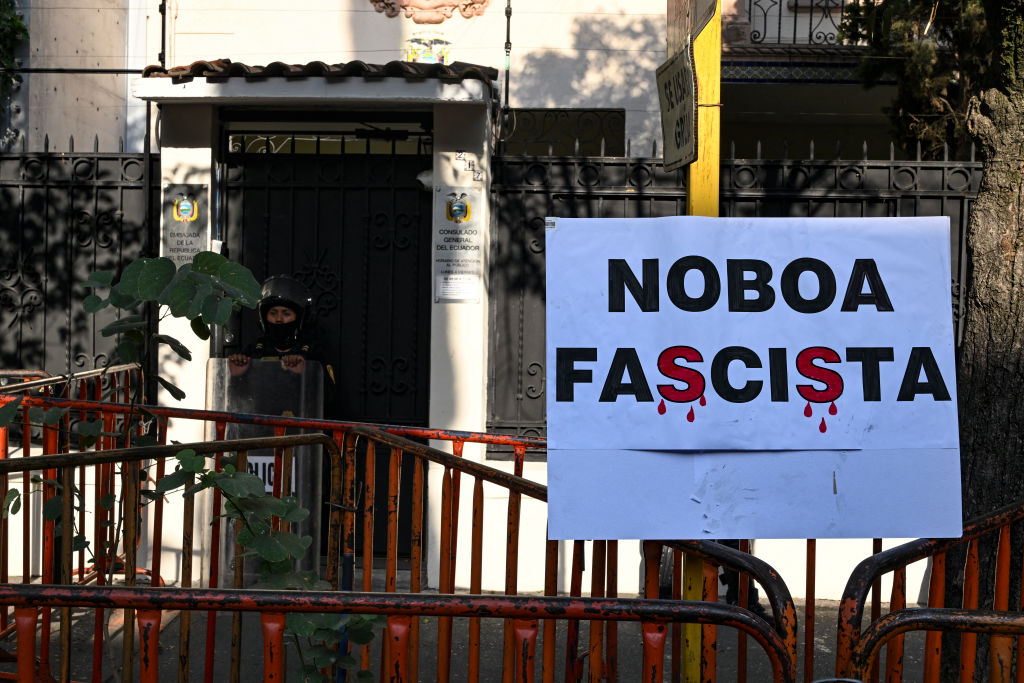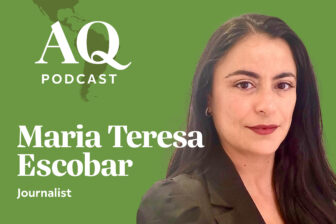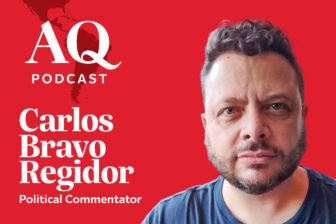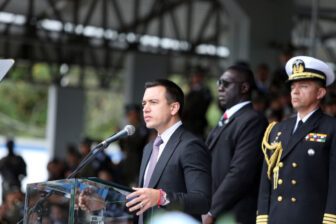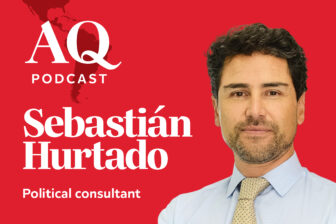QUITO—It may not be a major player on the global stage, but Ecuador is no stranger to major controversies involving diplomatic asylum and embassy raids. Wikileaks founder Julian Assange spent an extended period claiming asylum in the Ecuadorian embassy in London until he was forcibly removed by UK and Ecuadorian authorities in 2019. For seven years, this case placed Ecuador at the heart of a complex web of international disputes, challenging the norms of political asylum and the tensions between sovereignty and international law.
Now, the country finds itself once more embroiled in an international diplomatic dispute. On April 5, Ecuadorian police and military personnel forcibly entered the Mexican Embassy in Quito to arrest convicted former vice president Jorge Glas, wanted by Ecuadorian justice. The radical move, which has no precedent in a Latin American democratic nation, prompted Mexico to suspend diplomatic relations, intensified the political drama within Ecuador, and cast new shadows over its international relations.
Strong local reactions have mostly been divided along political lines, with one side supporting the move by citing the need to fight impunity at all costs, and the other decrying it as a politically motivated authoritarian crackdown on an opposition figure. Most balanced observers have raised serious questions about the broader implications of such actions on diplomatic conventions, the sovereignty of embassies, and political rights in Ecuador.
In the near term, this incident will likely be interpreted locally as a strong message from the Daniel Noboa government against corruption and impunity, aligning with electoral promises and public expectations ahead of a government-led national referendum later this month. By framing his actions against Glas and the associated political machinery as a crusade for integrity and lawfulness, Noboa appeals to most Ecuadorians disillusioned with the political status quo. This narrative, which portrays him as an outsider challenging corrupt established powers, could bolster his domestic credibility and position him favorably for next year’s upcoming presidential election.
However, such a bold move is prompting renewed comparisons between Noboa and Salvadoran authoritarian president Nayib Bukele. Noboa has disregarded such comparisons in the past, arguing that he is a democrat and that the “Bukele model” won’t work in Ecuador. But he looks increasingly prone to making use of more radical gestures—like launching an unprecedented internal “war” against criminal organizations—for political leverage. Some local commentators and even Noboa supporters have already raised concerns about what they see as a slide towards authoritarianism, a trend that could intensify in a second, full-length mandate.
Breaking with correísmo
On the other hand, the arrest has irrevocably damaged the already fragile relationship between President Noboa’s administration and correísmo, the movement associated with former President Rafael Correa, which backs now-imprisoned former vice-president Glas and is now demanding Noboa’s resignation. This rift strikes at the heart of Ecuador’s legislative and governance framework. With correísmo representing the largest bloc in Congress and wielding still considerable, although weakened, influence over national politics, it suggests a period of renewed political polarization, deadlock, and confrontation is imminent, which could hamper recent political cooperation between Noboa and opposition forces, which has so far helped him advance reforms in Congress.
From an international perspective, it is hard to see a potential upside to the Ecuadorian actions that, so far, have been criticized by most governments, international organizations and observers in the region. The international community has primarily focused on what looks like an unjustified government incursion into a sovereign embassy to arrest an opposition figure and the problematic precedent it could set for diplomatic representations around the world. Little attention will be paid to the details behind whether convicted vice-president Glas was worthy of asylum or whether Mexico was flaunting international conventions by housing him at the embassy.
That is why, contrary to previous crisis when reactions were divided between left and right-wing governments around the region, this time it has not been the case, with only a few close allies of the Ecuadorian government, notably the U.S., refraining from entirely condemning the actions by the Ecuadorian government, but rather emphasizing the “obligation of host countries under international law to respect the inviolability of diplomatic missions.”
A battle at the ICJ
Therefore, Ecuador will face an uphill battle at the International Court of Justice and other international and regional bodies, where Mexico has already announced it will bring its grievances. An international ruling on the matter will likely take a long time. Still, political resolutions condemning the events in Quito will immediately weigh on the international standing of Ecuador and the Noboa government in particular. They could even weaken future local or international judicial prosecution against Glas and other Ecuadorian political figures.
Even though Mexico is not a top trading or investment partner for Ecuador (Ecuadorian exports and Mexican FDI amounted to around $200 million and $6.7 million, respectively, in 2023), the country has an oversized geopolitical influence on other areas of Ecuadorian interest. For example, Mexico is a veto player within the Alianza del Pacifico, a major regional trade bloc Ecuador has been trying to join as a full member for several years, a possibility that now seems even more remote. Mexico could also leverage its influence over several Caribbean nations to block or delay the approval of the IDEA Act, a measure that would include Ecuador in the Caribbean Basin Economic Recovery Act, a program providing tariff-free access to the U.S. market, currently being considered by the U.S. Congress.
The diplomatic conflict also comes at a time when Mexico has become the single most crucial transit route for tens of thousands of Ecuadorians trying to illegally enter the United States, a human flow that, according to Mexican authorities, increased by 220% last year alone. Also, at a time when Mexican drug cartels are critical players in the massive expansion of the cocaine trade—and accompanying spike in violence—throughout Ecuador in recent years, a situation that should be calling for close security cooperation between the two countries.
Finally, it is quite concerning that a government dependent on the IMF and multilateral support to effectively deal with pressing financial challenges is willing to take such a risky geopolitical gamble during negotiations for a new program. These negotiations are unlikely to be derailed by this episode, but thanks only to the unprecedented political support the U.S. government is providing to President Noboa.
In essence, while this new embassy drama deepens political divisions and fuels instability, it also offers President Noboa an opportunity to frame his actions as part of a broader fight against corruption and criminal influence in politics and strengthen his appeal to voters looking for strong leadership and a new direction for the country.
This double-edged scenario underscores the complexity of contemporary Latin America’s political dynamics, where actions that divide can also, in the short term, strengthen a leader’s hand by appealing to public desires for justice and accountability. However, from an international perspective, it will further cement the perception of Ecuador as a structurally unstable country with little regard for international norms, constantly subject to the whims of local political leaders striving for short-term political gain.
—



